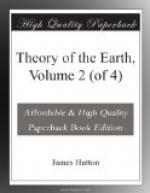The greatest part of the water which falls upon this extensive country is delivered into the Caspian by the river Wolga; and this water runs from the east and west sides, gathered in two great rivers, the Kama and the Oka. The water thus gathered from the two opposite extremities of this great kingdom meet in the middle with the Wolga, which receives its water from the north side. We thus find the water of this great plain running in all directions to its centre. Had this been the lowest place, here would have been formed a sea or lake. But this water found a lower place in the bed of the Caspian; and into this bason it has made its way, in forming to itself a channel in the great plain of the Wolga.
Our present purpose is to show that this channel, which the Wolga has cut for itself, had been once a continued mass of solid rock and horizontal strata, which in the course of time has been hollowed out to form a channel for those waters. These waters have been traversing all that plain, and have left protuberances as so many testimonies of what had before existed; for, we here find the horizontal strata cut down and worn away by the rivers.
M. Pallas gives us very good reason to believe that the Caspian Sea had formerly occupied a much greater extent than at present; there are the marks of its ancient banks; and the shells peculiar to the Caspian Sea are found in the soil of that part of its ancient bottom which it has now deserted, and which forms the low saline Steppe. He also makes it extremely probable that the Caspian then communicated with the Euxine or Black Sea, and that the breaking through of the channel from the Euxine into the Mediterranean had occasioned the disjunction of those seas which had been before united, as the surface of the Caspian is lowered by the great evaporation from that sea surrounded with dry deserts.
However that may he, it is plain, that throughout all this great flat inland country of Russia, the solid rocks are decaying and wearing away by the operation of water, as certainly, though perhaps not so rapidly, as in the more mountainous regions of the earth.
If there is so much of the solid parts worn and washed away upon the surface of this earth, as represented in our Theory; and if the rivers have run so long in their present courses, it may perhaps be demanded, Why are not all the lakes filled up with soil; and why have not the Black and Caspian Seas become land or marshy ground, with rivers passing through them to the ocean? Here is a question that may be considered either as being general to all the lakes upon the earth, or as particular to every lake which should thus find a proper explanation in the Theory. With regard to the last of these, the question has already been considered in this view, when the particular case of the Rhone was taken as an example; and now we are only to consider the question as general to the globe, or so far as belonging to the Theory, without particularising any one case.




